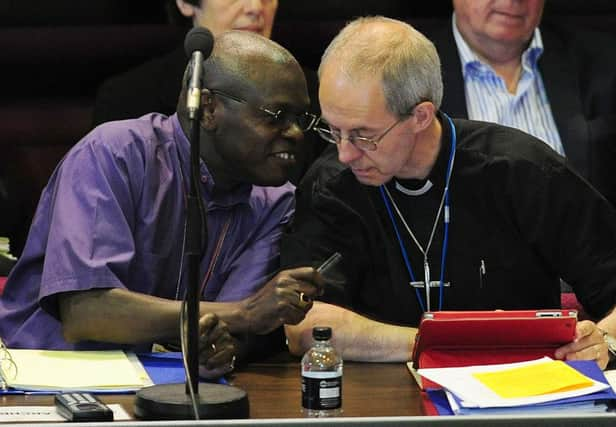Jonathan Gibbs: Church must lead way to a new kind of political vision


They seem determined to treat voters as children looking for handouts of sweets, concerned with what’s in it for them, rather than as adult human beings who are interested in the kind of world we are making, both for our own generation and for those who will come after us.
For the most part I find it very difficult to work out what people stand for, and so much of the debate is couched in intensely negative terms, focusing on instilling fear about what the other lot might do if they get into power. It is divisive and it is corrosive – and somebody needs to say “Stop!” and then to try and set us off in a different direction.
Advertisement
Hide AdAdvertisement
Hide AdChristians cannot of course (thank goodness) impose their moral and political vision on the life of our nation. But we can and must seek to contribute to the formation of a new vision for our shared life and a new way of doing politics. This needs to happen right down at the level of every local church and parish – and at the level of our contribution to political debate.
Churches must seek to become beacons of hope and communities of people who are learning to live differently and to refuse the culture of fear and suspicion which so characterises much of life today. That means reaching out in friendship to those who are different to us, whether in terms of race, religion, background or wealth. It means nurturing young people and adults who take responsibility for their lives and who are willing to care for others and help them in their turn to take responsibility for themselves and the world around them.
At the same time, we need “vision casters”, people who can help envision a new and better way of living which can capture people’s imaginations as well as their hearts. For that perhaps we do even need bishops who can tell the story of what God has done and is doing in Jesus Christ with clarity and confidence and maybe even (please!) a little passion and fire. I am genuinely so disappointed in much of what passes for political rhetoric today, because it reads so often like an extended list of “what we’ll do for you” rather than a vision for a better world, or at least one marginally better than the one we inherited.
This is something that our young people so desperately need and deserve; it is perhaps even why the myths and lies of the so-called Islamic State seem to have captured the imagination of so many – because in however twisted a way it seems to them to portray something bigger, better, bolder than sitting in front of a games console and knocking back a few beers.
Advertisement
Hide AdAdvertisement
Hide AdOver recent years, many of the young people I have worked with have been excited and motivated by the chance to make a difference to their own lives and to the lives of others by getting involved with projects in this country and overseas – projects that push them outside their comfort zone and that change who they are as well as changing those with whom they become involved.
For now, I don’t think many of our politicians have got it at all. And I think that means we do need bishops and others – people of all faiths and none – who are willing to challenge what we are being offered and what is being done in our name, in the hope and expectation of changing the terms of the debate and also the whole way political debate is conducted in our nation. But that doesn’t let you and me off the hook either; we can’t just palm this off on someone else. Real change will require ordinary people to get engaged in both action and discussion about forging new ways of doing things and new ways of working together for the good of all.
The role of the Church in this is two-fold. Firstly, it is to create communities of hope – counter-cultural places which keep on celebrating the possibility that things can be different. And secondly, it is to help the world to see that there is a better way of going about things, and to hear about the hope we have in Christ that enables us to live differently even in a dog-eat-dog world.
Our politicians need all the help they can get. We should pray for them; we should treat them with respect (well, most of the time anyway) and we should hold them accountable for the kind of world they are trying to sell to us, not least in the run-up to a General Election. But, in the end, politics is far too important to leave to the politicians.
• The Right Reverend Dr Jonathan Gibbs is Bishop of Huddersfield. He delivered the Harold Wilson lecture at Huddersfield University last night.